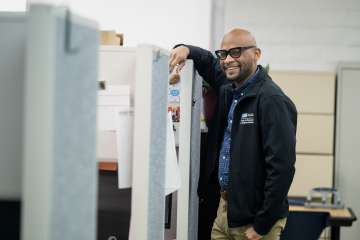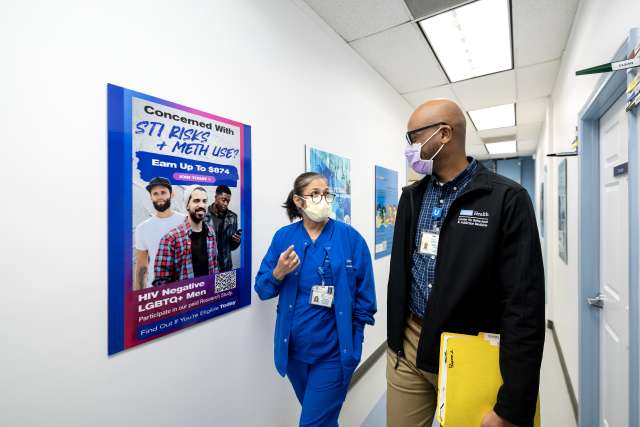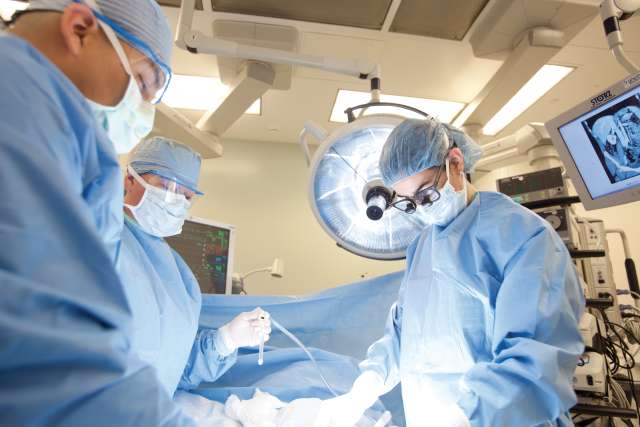Christopher Blades has been a clinical researcher at UCLA’s Center for Behavioral and Addiction Medicine (CBAM) for 13 years, working on larger-scale network protocols as well as investigator-initiated clinical research studies.
Currently, Blades oversees three protocols in his role as a clinical research study coordinator. Given his passion for conducting research – and working with study participants – it’s a role for which he is well-suited.
“Every day is different,” Blades says. “I mean, I can see someone who is having a really hard time with life in the moment and then, within 30 minutes, see someone who is in a completely different world. You never know what the day is going to bring. That excites me.”
CBAM is affiliated with UCLA’s Department of Family Medicine and Department of Medicine Infectious Diseases and is located within UCLA Vine Street Clinic, in an area of working-class poor in Hollywood designated as medically underserved.
Established in 2005, Vine Street Clinic has served as a site for clinical trials, observational and behavioral research and direct services focusing on treatment for addiction, HIV prevention, and the intersection of the two.
Its mission, Blades explains, is to bridge the gap between community and research.
Varied studies
“Because of where we’re located, we have created a unique opportunity for ourselves,” says Blades, who notes the clinic’s accessibility to public transportation and its nondescript building, which protects the confidentiality of study participants.
Over the years, clinical research at Vine Street has evolved from observational and behavioral research to longitudinal studies, he says.
Current clinical studies are centered around methamphetamine, cocaine and opioid use, those looking at long-acting, injectable medications to prevent the transmission of HIV, and observational studies for gay-identified men who are sexually active.
In addition, a study is underway through the HIV Prevention Trials Network to introduce people struggling with opioid-use disorder to a medication called buprenorphine. Called the HPTN94 study, it is being conducted from a mobile clinic that is on the streets of L.A. County four days a week.
Blades notes UCLA is one of just five research locations in the country conducting this study.
“We know a lot of times people that are struggling with opiates tend to move around a lot,” he explains. “And to have a clinic that offers those services on a mobile unit, I think, is ideal. But to show that it can work, you have to then compare it to what’s already been established. That’s what we’re doing with this project.”
Evolving role
Blades started his career with CBAM as a community outreach promoter, was promoted to community education and outreach manager, and recently advanced to clinical research coordinator for several trials, including Gilead's Purpose-2 trial of Lenacapavir for PrEP, an antiviral medicine used to treat HIV/AIDS (site Investigator Jesse Clark, MD, MSc), as well as research projects developed by UCLA’s Michael Li, PhD, MPH, and Cherie Blair, MD,PhD.
As a clinical research coordinator, he stays in constant communication with the studies’ principal investigators; he also develops the flow of the visits, keeps track of the participants as they’re moving through the study, and works closely with UCLA Health’s financial department and the sponsors of the trials.
Blades, who is also the center’s community education program manager, does most of the community engagement for the clinic along with recruiting study participants, phone screening, scheduling and rescheduling, randomization and determining eligibility.
Making a difference
Blades grew up in Los Angeles and earned a bachelor’s degree in psychology and health and human services from Cal State Dominguez Hills. His background is in public health, but he transitioned into clinical research as a peer health navigator about 15 years ago.
Blades’ passion for working with marginalized communities is deeply personal.

“When I got into this field, it was really centered around what I was seeing around me,” Blades explains. “People in my social circle were contracting HIV, becoming sick, not really taking care of themselves, and I felt like I wanted to be the voice for them. I wanted them to see themselves in this kind of research I’m doing.”
Through his work at Vine Street, Blades has experienced countless times when he knew he was making a difference. One of the more powerful, he recounts, was an interaction he had with a study participant who was homeless and in the throes of drug addiction.
Throughout a series of engagements with the man, Blades and the staff were able to link him to various services in the community. Through those services, the man eventually found housing, employment – and long-term sobriety.
“That was an experience that I think I will remember for a long time,” says Blades. “To be able to help people that are struggling with something that’s out of their control is always rewarding.”
Building trust
Blades notes that establishing trust in the community has been vital to the clinic’s success.
“Medical mistrust is something that has been an issue in marginalized communities, and I think it takes a lot of buy-in from the community for you to have a good reputation in the community,” he says. “So, we want to make sure not just that the participants have an enjoyable experience, but that they feel comfortable in the space they're in to express whatever concerns or feelings or thoughts they may be having about their own experience, about their experience with staff, about their experience on whatever medication we're studying, so that they feel heard as well.”
During the pandemic, the clinic partnered with Moderna to conduct a phase 3 trial of the company’s mRNA vaccine. In more than 90 trial sites across the country, Vine Street led in diversity recruitment for two weeks, with 80% of participants identifying as BIPOC – a direct result of the relationships Blades and the staff have built in the community.
Blades says ensuring participants feel heard and supported is important because many participants share their personal experiences at the clinic with the people in their social networks.
“It’s important that we are representing UCLA as well,” he adds. “I think that will help diminish some of that medical mistrust that people experience.”
Models of Pride
For the past several years, Blades has served as UCLA’s captain for Models of Pride, an event for LGBTQ+ youth and young adults sponsored by the Los Angeles LGBT Center. The annual event features music and food, a job fair and information on resources in the community.
Blades finds his role especially meaningful because of the event’s focus on youth.
“There are a lot of Pride events throughout L.A. County, but they’re never specifically geared toward youth or young adults. And this event is. It creates a kind of safe space and allows them to obtain information that can benefit not just their health, but their overall well-being,” Blades says.
Raising awareness
Blades enjoys the community outreach aspect of his job almost as much as doing research. He hopes his team’s work to educate the public at health fairs and community-based events will shine a light on the resources Vine Street Clinic can offer.
“In my experience, people who are struggling with addiction and seeking help are often labeled a certain way, and people turn them away, and that has a lasting effect on them as individuals,” Blades says. “I would like for people to have a better understanding and awareness of who we are as a center and the services that we offer.”
Jennifer Karmarkar is the author of this article.



